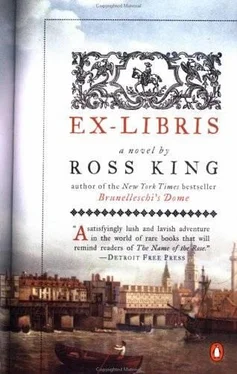'What do you mean?' I was leaning forward in the chair. 'Rescued how?' I remembered her description of the books, that evening in Pontifex Hall, as 'refugees', along with her claim that some of them had survived a shipwreck. I wondered if she was about to say something about the 'interests' and 'enemies' of which she had spoken.
'From Cardinal Baronius.' The pipe stem clacked quietly between her teeth. 'The keeper of the Vatican Library. Perhaps you know his work? He wrote at length on the Corpus hermeticum . You may read about it in his history of the Roman Church, the Annales ecclesiastici , published in twelve volumes. In his time Cardinal Baronius was one of the world's foremost authorities on the writings of Hermes Trismegistus. He took up his pen in order to refute the work of the Huguenot theologian Duplessis-Mornay. In 1581 Duplessis-Mornay had published a Hermetic treatise entitled De la vérité de la religion chrétienne . He dedicated it to the Protestant champion of Europe, Henry of Navarre, whose counsellor he later became. The work was translated into English by Sir Philip Sidney.'
'Another Protestant champion,' I murmured, remembering how Sidney-that great Elizabethan courtier who died fighting the Spaniards-had been the namesake of the ship built for Sir Ambrose, according to the patent, in 1616.
I closed my eyes and tried to think. The name Baronius was familiar, though not because of either Duplessis-Mornay or the Corpus hermeticum . No: a cardinal of that name was the man responsible for the transportation-the theft-of the Bibliotheca Palatina in 1623, after the Catholic armies invaded the Palatinate. It was one of the most outrageous scandals of the Thirty Years War. Some 196 crates of books from Germany's greatest library, the centre of Protestant learning in Europe, were carted across the Alps by mule-train, with each mule wearing round its neck, on a silver label, the same inscription: fero bibliothecam Principis Palatini . The books and manuscripts had disappeared, one and all, into the Bibliotheca Vaticana.
Or had they? I opened my eyes. The wine and the smoke between them were addling my brain, but now I also remembered Alethea's claim that Sir Ambrose had worked in Heidelberg as an agent for the Elector Palatine. An idea slowly swam towards the surface.
'The books at Pontifex Hall have come from the Bibliotheca Palatina. Is that what you're saying? Cardinal Baronius didn't steal all of them after all. Sir Ambrose rescued them from-'
'No, no, no…' She shied the pipe in an arc through the air. 'Not from the Palatina.'
I waited for her to continue, but the Virginia tobacco seemed to have induced in her a mood of voluptuous repose. She leaned over the edge of the bed and rapped the bowl of the pipe against the hearthstone. I cleared my throat and chose another tack.
'And was it Cardinal Mazarin,' I asked as gently as I could, 'or his agents, who… who…'
'… who murdered Lord Marchamont?' Her voice came thickly from among the nest of pillows. 'Yes. Perhaps. Or so I believed at one time. My husband was murdered in Paris. Have I told you that? We were crossing the Pont Neuf in our coach when we were set upon near the spot where Henry of Navarre was murdered by Ravaillac. He was stabbed in the neck with a poniard,' she continued calmly, 'also like King Henry. There were three assassins, all on horseback, all dressed in black. I shall never forget the sight of them. Black livery with gold trim. It was dark, but I was meant to see them, you understand. I was allowed to see their uniforms, their faces. It was intended as a warning.'
'A warning from whom? From Cardinal Mazarin?'
'I thought as much at one time. But events have changed my mind. I now believe the assassins were hired by Henry Monboddo.'
I licked my lips and drew a careful breath. 'But why should Monboddo have-?'
' The Labyrinth of the World ,' came her voice through the muggy darkness. 'That is why, Mr. Inchbold. No other reason. He wanted the parchment. Not the rest of the collection, only the parchment. He was obsessed with it. He had found a buyer who desperately wished to acquire it. Someone who was willing to have my husband murdered. And now it would seem that my husband's worst fear has been realised,' she added after a short pause, her voice once more growing faint. 'If what you say is true, then Monboddo has laid his hands on it at last.'
The tiny flame beside the window leapt and dived. The fields beyond were dark and silent. I could feel my sideburns prickling, the gooseflesh raising itself along my forearms. From somewhere below the stairs came the slow shuffling of Phineas's feet and the arthritic creaking of floorboards. When I looked to the bed I saw that Alethea had raised herself so that she now sat upright beneath the canopy, her arms wrapped round her knees. I could feel her eyes upon me.
'Arrangements have been made,' she said at last.
'Arrangements, my lady?'
'Yes, Mr. Inchbold.' The bed gave a groan as she pushed herself to her feet. Her shadow fell lengthwise across me. 'A visit to Wembish Park seems in order, does it not? The manuscript must be recovered. And we must make haste to reclaim it before Monboddo can sell it to his client. But you must be careful,' she whispered as she led me to the staircase, 'very careful indeed. Take my word for it, Mr. Inchbold: Henry Monboddo is a dangerous man.'
***
An hour later I was back in Nonsuch House, back in my study, nodding off over a tobacco-pipe and Shelton's translation of Don Quixote . I had reached the bridge without incident, without being followed. Or so it seemed, but my senses were dulled and the night black as tar. I dozed off a couple of times, and the driver had to shake me awake when we reached our destination. Now I could neither keep my pipe alight nor concentrate on the pages of Don Quixote , through which I was blundering without managing to glean a scrap of sense.
A visit to Wembish Park seems in order…
Yes: the faint, meandering scent I had been following was stronger now and seemed to direct me, urgently and unambiguously, to Wembish Park and Henry Monboddo. But whatever optimism I had felt earlier in the day, in Alsatia, had now vanished completely. I thought of Lord Marchamont murdered on the Pont Neuf and then of the solitary figures who had shadowed me.
Henry Monboddo is a dangerous man…
I pushed myself upright and then walked to the window. The sky rose black and starless; below it, the city looked lightless except for the wavering lanterns on the poop-rails of a few merchantmen far downstream in the Limehouse Reach. Unfurling their sails, I supposed, and putting to sea on the first of the ebb, which I could hear fluxing with its familiar rush between the piers.
I yawned again, clouding the window-panes with my breath. Hearing a faint chime from the floor beside me, I peered down to see a glint on the boards. A key. I turned it over in my hand, speculatively, watching the polished brass shine in the candlelight. Alethea had given it to me as we parted in the darkened atrium of Pulteney House. It unlocked a small strongbox that would be concealed beneath the stone lozenge on top of a grave in the churchyard of St. Olave's, Hart Street, not far from the north end of London Bridge. We would have to use the strongbox for any future communications, she explained, because her post was being opened-a realisation that had come, I thought, a little late in the day. Nor could we meet again at Pulteney House, which she said she might, in any case, soon be departing. She would therefore leave any further letters for me in the churchyard, cached in the grave of a man named Silas Cobb.
I slipped the key back inside my pocket and took up my book. Once more I would be leaving London, I realised, for an unknown destination, somewhere fraught, possibly, with numerous perils. I felt like an old knight in a tale of chivalry: an impoverished hidalgo with his broken lance and dented shield setting off, at the whim of his beloved, into a world of intrigues and enchantments, bent on some impossible task.
Читать дальше












